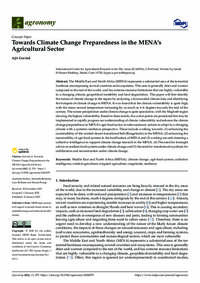Towards Climate Change Preparedness in the MENA’s Agricultural Sector

Authors:
The Middle East and North Africa (MENA) represents a substantial area of the terrestrial landmass encompassing several countries and ecosystems. This area is generally drier and warmer compared to the rest of the world, and has extreme resource limitations that are highly vulnerable to a changing climate, geopolitical instability and land degradation. This paper will first identify the nature of climate change in the region by analyzing a downscaled climate data and identifying the hotspots of climate change in MENA. It was found that the climate vulnerability is quite high, with the mean annual temperature increasing by as much as 4–6 degrees towards the end of the century. The nature precipitation under climate change is quite speculative, with the Maghreb region showing the highest vulnerability. Based on these results, five action points are postulated that may be implemented to rapidly progress our understanding of climate vulnerability and enhance the climate change preparedness in MENA’s agri-food sector, to take necessary actions to adapt to a changing climate with a systemic resilience perspective. These include working towards: (1) enhancing the sustainability of the rainfed-desert transitional belt (Rangelands) in the MENA; (2) enhancing the sustainability of agri-food systems in the food baskets of MENA and (3) working towards fostering a collective intelligence to support climate change research in the MENA. (4) The need for foresight advice on resilient food systems under climate change and (5) the need for transformative policies for stabilization and reconstruction under climate change.
